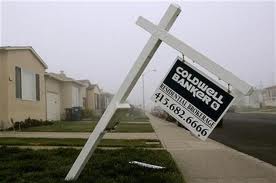As the auction market at the courthouse steps for trustee sales has gotten more and more crowded, many investors are starting to turn their attention to the short sale market. The increased competition is causing prices to be bid up to levels where reward no longer makes as much sense as it once did for auction buyers.
 As the auction market at the courthouse steps for trustee sales has gotten more and more crowded, many investors are starting to turn their attention to the short sale market. The increased competition is causing prices to be bid up to levels where reward no longer makes as much sense as it once did for auction buyers. Here is why.
As the auction market at the courthouse steps for trustee sales has gotten more and more crowded, many investors are starting to turn their attention to the short sale market. The increased competition is causing prices to be bid up to levels where reward no longer makes as much sense as it once did for auction buyers. Here is why.
When you buy home through traditional channels, including most short sales, you are able to view the property inside and out before purchasing it. You also get to inspect the property, you receive title insurance, and get the benefit of working with an active San Diego real estate agent.
However, when purchasing through a trustee sale, you do not get any of those benefits. You normally do not even get to see the home’s interior until after you own it. This could mean that there are major issues that you will not know about until you own the home and you assume full responsibility for them. This could include things like foundation issues, roof leaks, mold, and other material facts that would affect the property’s value.
So why would an investor subject themselves to this much risk? Because traditionally the reward was just as big. You can normally expect a larger return for the increased risk of a trustee sale vs the market exposure of a short sale. Unfortunately for investors, the trustee sale market is now so crowded that the risk just doesn’t make as much sense as it used to. According to David Tal of Short Sale Agent Finder, “Investors are looking to short sales more than ever before.”
I recently experienced this in San Diego when I listed a short sale in a below middle class sub market of the city and I was bombarded with offers from the guys most well known for their auction investments. One of them explained to me that the margins have just been squeezed so much by the level of demand that they now prefer the increased control of a short sale vs an auction.
The tough thing for ordinary real estate buyers, most notably first time buyers, FHA buyers, and VA buyers is that as investors turn their attention more and more to the general market and away from the trustee sales, it makes it much harder for them to buy anything regardless of how qualified they are. Most sellers will work with a cash offer closing in 10 days far before considering an FHA loan buyer that needs to close in 45 days or more because of how backed up the banks are.
There is tremendous frustration in the market right now from buyers that have made dozens of offers and can’t get them accepted. At this point we are working with multiple buyers that are making blind offers at full price or greater anytime a home comes on the market that roughly matches what they are looking for because they know that spending the time to view the property could easily turn into a waste of time for them. They have been through it too many times and by the time they get to offer number six, ten, even fifteen, buyer fatigue tends to set in.
That is a nightmare for any real estate agent that has just spent months showing a client property and is at risk of losing them due to the market conditions.
Funny how only a short time ago we were praying that buyers would get off the fence and inventory was growing out of control. Now we can’t get to the property or write the offer soon enough.
The other disadvantage that non investor short sale buyers have is that they are only buying one home, which means that if a seller chooses to get in bed with them over the course of a two, four, or possibly six month waiting period while the bank approves the short sale the buyer could easily find another home over the course of that time and jump ship, leaving the seller out to dry and with no recourse. That is why we have always seen short sales come back to the market multiple times before finally finding a final buyer that closes escrow.
On the flip side, when a strong investment group makes an offer on a short sale, they can typically afford to wait it out and also buy others along the way without it affecting the one they had previously tied up. They are also better able to deal with repair issues since they are often going to gut the place anyway.
A region that will be interesting to track will be the Long Island NY real estate market as it digs itself out of Sandy’s destruction and back to a functional state. We can probably expect to see a spike in distressed assets there and it may very well be investors that help accelerate its recovery.
Daniel Beer is a San Diego MLS agent and the head of the San Diego Home Finder team focusing on Carmel Valley homes for sale in San Diego. He is also an active real estate writer around the internet with a focus on providing transparency to the market.



